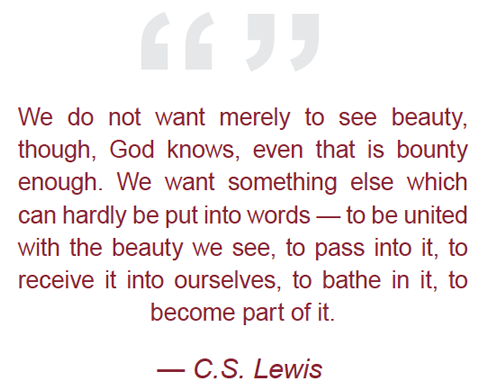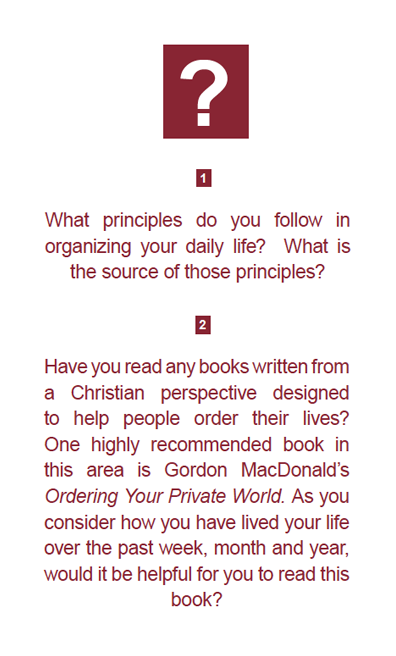Back to series


Recommended Reading:

Download or Listen to Audio
Challenging the Gospel of efficiency
Click here to open a Print-Friendly PDF
Since I was a child, efficiency has been lauded as one of my greatest strengths. My mother bursts with pride as she explains to anyone who will listen that her daughter is a master of speeding through the list of tasks set before her in record time. For as long as I can remember, my mind has been busily working away to determine the quickest route to the grocery store, the most productive arrangement of dishes in the dishwasher, and the minutes that could be trimmed from work meetings. It became a sort of game that I would play with myself, day in and day out, rarely questioning why I felt compelled to do so.
 Growing in faith in college and then in Washington, D.C., though, the question of the motivation behind my fixation with efficiency loomed larger in my mind. As in many cities, in D.C. there are few resources more valuable than time, and the principle of maximizing efficiency stretches it as far as it can go. However, if I am meant to submit everything to God’s authority, that surely includes this primary principle in ordering my life. Looking to Jesus, I couldn’t say that His actions seemed to be dictated by efficiency, or at least not by the efficiency by which I operated. It seemed that the guiding tenet of my daily life was on a collision course with the command to emulate my Savior, so I sought to understand what I was missing. Exploring this concept in Scripture and attempting to apply these ideas in my daily life, I found my ideas of worship, orientation toward beauty, and patience revitalized, and my system of prioritization challenged.
Growing in faith in college and then in Washington, D.C., though, the question of the motivation behind my fixation with efficiency loomed larger in my mind. As in many cities, in D.C. there are few resources more valuable than time, and the principle of maximizing efficiency stretches it as far as it can go. However, if I am meant to submit everything to God’s authority, that surely includes this primary principle in ordering my life. Looking to Jesus, I couldn’t say that His actions seemed to be dictated by efficiency, or at least not by the efficiency by which I operated. It seemed that the guiding tenet of my daily life was on a collision course with the command to emulate my Savior, so I sought to understand what I was missing. Exploring this concept in Scripture and attempting to apply these ideas in my daily life, I found my ideas of worship, orientation toward beauty, and patience revitalized, and my system of prioritization challenged.
Lessons from Mary
I love my daily to-do list. It gives me a concrete sense of order and purpose, a clear path for the day ahead.
can execute it ruthlessly, piling up the accomplishments as the hours pass without a minute wasted. In contrast, in the Gospels, I saw Jesus seemingly lazing around, often taking the scenic route, and certainly not jampacking His days with miracles and healings the way that I thought He should. If He had only a limited amount of time on earth, why not see as many needy people as possible? Why not stuff every hour of the day with physical and emotional healings? Where is the assembly line of miracles? I was forced to conclude that Jesus and I did not look at efficiency the same way.
Diving deeper into the passages where Jesus’s actions seemed less than efficient, there were two that stuck in my mind as examples of seemingly inefficient use of resources. The first from the Gospel of Luke: As Jesus and his disciples were on their way, he came to a village where a woman named Martha opened her home to him. She had a sister called Mary, who sat at the Lord’s feet listening to what he said. But Martha was distracted by all the preparations that had to be made. She came to him and asked, “Lord, don’t you care that my sister has left me to do the work by myself? Tell her to help me!”
 “Martha, Martha,” the Lord answered, “you are worried and upset about many things, but few things are needed — or indeed only one. Mary has chosen what is better, and it will not be taken away from her.” (Luke 10:38–42 NIV)
“Martha, Martha,” the Lord answered, “you are worried and upset about many things, but few things are needed — or indeed only one. Mary has chosen what is better, and it will not be taken away from her.” (Luke 10:38–42 NIV)
I have heard far too many sermons with a title that is some version of “Being a Mary, Not a Martha,” and I cannot help but resent them. I identify intensely with Martha — frenetically preparing the house for an honored guest, harried without the help of her sister, and, above all else, anxious. As a kid, I would get incredibly frustrated with my older brothers when they didn’t help with chores as I did, and it was easy for me to see the same sibling dynamic in this passage. But Jesus tells me, and every other person on top of a personal to-do list, that Mary’s actions are not motivated by laziness; in fact, Mary has made the better choice, even as she looks like she is accomplishing nothing. This passage pointed to a clear distinction between the way that I structured my day and the way Jesus did, revolving around the definition and value of “accomplishments.” Perhaps serving God was not as simple as checking off a to-do list. But another Mary had more to teach me through a second passage, in the Gospel of John —Then Mary took about a pint of pure nard, an expensive perfume; she poured it on Jesus’ feet and wiped his feet with her hair. And the house was filled with the fragrance of the perfume.
But one of his disciples, Judas Iscariot, who was later to betray him objected, “Why wasn’t this perfume sold and the money given to the poor? It was worth a year’s wages.” (John 12:3–5 NIV)
I confess that I am sympathetic with Judas’s reaction here. Jesus is here, at least in part, to bring relief to the poor, and Mary must have known that. Couldn’t Mary have used the funds spent on the nard to provide aid to those in need of food or clothing? But Jesus understood what Mary was doing and lauded the beauty of her act — an act of worship.
Worship and Accomplishment
That word, worship, seemed to be the key. When the first Mary sat at Jesus’s feet, taking in His every word, that was a form of worship. When the second Mary spent an exorbitant amount of money to buy perfume to honor Jesus’s coming sacrifice, that too was worship. Both of their acts were clear representations of how much they valued Jesus. My earthly efficiency-oriented eyes looked at these and many other acts of worship and did not recognize their value. After all, where’s the accomplishment? What’s the end product?
 Jesus specifically took the time to stop and recognize these acts as valuable; more specifically, He scolded those who complained that their acts were inefficient. God must see a significance in these acts of worship that elevates them above the routine accomplishments of my everyday life. As I took in God’s words, I noticed two points of disconnection between my view of worship and God’s that would have a real impact on how I prioritized my time: the “accomplishment” of worship itself and the ways that worship could be a part of daily life.
Jesus specifically took the time to stop and recognize these acts as valuable; more specifically, He scolded those who complained that their acts were inefficient. God must see a significance in these acts of worship that elevates them above the routine accomplishments of my everyday life. As I took in God’s words, I noticed two points of disconnection between my view of worship and God’s that would have a real impact on how I prioritized my time: the “accomplishment” of worship itself and the ways that worship could be a part of daily life.
In his Reflections on the Psalms, C.S. Lewis observed that it was in the process of being worshiped that God communicated His presence to men. Especially in the first story of Mary, this concept is eminently logical: By turning her full attention to God in her act of worship, Mary is literally able to hear what Jesus is telling her as Martha scurries in and out, too distracted to receive Jesus’s message. Mary is deliberately setting her eyes on heavenly things, rather than earthly things, as God commands us to do.
 Worship is not merely the means by which God reaches down to us, but one of the means that He uses to mold us in our process of sanctification. Jesus declares that wherever our treasure is, there our heart will be also, and our acts of worships ingrain these choices into our lives. In the passage from John, Mary’s physical action gives up that which is exceedingly costly on earth, giving it away in favor of her King. Even while honoring Jesus, the act solidifies in her own understanding the authority that she is ceding to Him. In the same way, our physical acts of worship, as common as bowing our heads or kneeling, affirm and reaffirm that our treasure is Jesus alone. As bodily creatures, ingesting information alone is not enough to be conformed to the image of God; we must take action.
Worship is not merely the means by which God reaches down to us, but one of the means that He uses to mold us in our process of sanctification. Jesus declares that wherever our treasure is, there our heart will be also, and our acts of worships ingrain these choices into our lives. In the passage from John, Mary’s physical action gives up that which is exceedingly costly on earth, giving it away in favor of her King. Even while honoring Jesus, the act solidifies in her own understanding the authority that she is ceding to Him. In the same way, our physical acts of worship, as common as bowing our heads or kneeling, affirm and reaffirm that our treasure is Jesus alone. As bodily creatures, ingesting information alone is not enough to be conformed to the image of God; we must take action.
Spending time in worship, both mentally and physically, will slowly shape us more and more into the image of Jesus, who found all His value in God. Conversely, spending time in pursuit of worldly goals ingrains in our hearts that our treasure is finished to-do lists or the feeling of accomplishment or the admiration of our peers.
Beauty and Patience
Exploring the concept of worship forced me to realize that I had a very different view from God of what a worthy accomplishment looked like. At the end of the day, I wanted to be able to say that I had studied a new language, cleaned up my apartment, or comforted a friend in need. God wanted me to say that I had made progress, visible or not, in being conformed to His image. This is the crucial process of sanctification, and it is not as easy as formulating and finishing a to-do list. It requires me to engage daily with God, focusing and refocusing on His kingdom rather than earthly ones, and to take action in accordance with the values of His kingdom, often in conflict with our human ones.
Keeping these concepts fixed at the front of my mind, I walked through my days a little differently. Unsurprisingly, I found myself to be less efficient from the purely earthly standpoint. There were many ways in which I noted a clash between my instinctive tendency to take action to feel accomplished and the desire to live worshipfully, but two were particularly evident to me and changed the pace with which I walked through life.
The first of these was my orientation toward beauty. I freely admit that I am not as gifted as many of my friends and colleagues creatively or artistically, though I would not consider myself completely bereft of talent. As soon as I began to question efficiency as the guiding principle for organizing my life, it became starkly obvious that I was lacking not artistic talent but a tendency to recognize and meditate upon beauty. In the simplest possible terms, I thought that to stop and smell the roses was a luxury that I could afford to cut out of my life — all for the sake of efficiency, of course.
But God wants us to recognize beauty just as He did for Mary’s beautiful act of worship. He wants us to see beauty, think about where it came from, and let it settle in our minds, if only so we can remember the goodness of creation and the One who made it. In the fast-paced world of breaking news, we devote hours and hours to keeping up with the latest events, often shaking our heads at the sinfulness of the world, yet we rarely devote more than a few seconds a day to gazing at the sunlight filtering through the leaves, appreciating a well-cooked meal, or getting lost in a piece of music.
While we should never bury our heads in the sand, reflecting on beauty forces us to remember (1) that there is hope in the midst of a broken world and (2) from whom that beauty comes. It leads naturally to adoration and gratitude for God and His mercy toward us. Beauty can take us out of ourselves, shifting our perspective from a myopic view focused solely on our own problems, to a wider outlook that gives a more complete understanding of God’s actions and nature. As Psalm 19 reminds us, the heavens declare His glory — and we should spend more time listening.
 The second was patience or, more precisely, my method of balancing the need for speed with the need to act as part of the cooperative body of Christ. As a follower of Jesus Christ, I know it must seem obvious that patience with my brothers and sisters in Christ should be prioritized; after all, patience is among the fruit of the Holy Spirit. In my efficiency-driven mind, though, the greater good was nearly always served by completing as many tasks as possible — which usually meant working my way through my todo list without much regard for involving others.
The second was patience or, more precisely, my method of balancing the need for speed with the need to act as part of the cooperative body of Christ. As a follower of Jesus Christ, I know it must seem obvious that patience with my brothers and sisters in Christ should be prioritized; after all, patience is among the fruit of the Holy Spirit. In my efficiency-driven mind, though, the greater good was nearly always served by completing as many tasks as possible — which usually meant working my way through my todo list without much regard for involving others.
God does not independently plow through a series of tasks in order to redeem the earth; instead, He calls disciples to Himself and uses them to accomplish His purposes. To me, it seems obvious that working through humans is not the quickest method at God’s disposal, but He has mercy upon us and chooses to include us in His plans as a kindness to us. It is our privilege as followers of Christ to be a part of His incredible plan to save the earth, and our actions in service of His plan are important parts of our formation as disciples of Christ. I imagine that He frequently draws upon His infinite reserve of patience as He watches us stumble toward His ends — and I am to emulate His example.
I dreaded group projects when I was in high school, because I inevitably ended up doing all the work myself. I was quick to assume that the work of others would not meet my standards of quality or speed, and I confess that this trait has followed me into my adult life. It is critical now for me to recognize that every part of the body of Christ is essential, with unique and valuable contributions to God’s salvation project. To insist upon doing everything myself as I serve God may be the speediest option, but it deprives others of the growth that can come from participating in God’s plan, and it will diminish the richness of the final product. Patience must be my watchword, a constant reminder that God’s timing is not my own, and God has placed other valuable members of the body of Christ around me who are often better fit for the task at hand than I am.
A Caveat
I would be remiss if I did not pause and add that Martha, though surely in need of a new perspective and a reshuffling of priorities, was a valuable follower of Christ. The actions she undertook are also acts of worship, which include acts of love as tangible as cooking meals, cleaning houses, and setting up chairs before a service.
he fact remains: Some tasks need to be done, and someone must do them. I strongly believe that where I run afoul is not in completing many tasks, but in failing to remember why I am doing them. If I do not keep Christ at the forefront, I can never correctly prioritize how I spend my time.
As we seek to follow Christ in our bustling lives, let’s seek to rebuff the endless push to do more, more, more. Instead, let’s take time to enjoy the goodness of God’s creation and remember the wonderful Creator it came from. Let’s slow down and remember that the people around us are image bearers of Christ who deserve our patience as we work together in the process of sanctification. Let’s worship God in all we do.

Ruth Lovejoy
SpeakerRuth Lovejoy, C.S. Lewis Fellow, recently finished Year 2 of the C.S. Lewis Fellows Program in Washington, D.C. She graduated from Yale University in 2013 with a degree in Modern Middle Eastern Studies, where she led Bible studies with Campus Crusade for Christ. Since then, she has been living and working in the D.C. area and is currently a member of National Presbyterian Church.

Recommended Reading:
Gordon MacDonald, Ordering Your Private World (Thomas Nelson, Revised, Updated edition, 2017)
We have schedule planners, computerized calendars, smart phones, and sticky notes to help us organize our business and social lives every day. But what about organizing the other side of our lives, the spiritual side?
One of the great battlegrounds is within the private world of the individual. The values of our Western culture would have us believe the busy, publicly active person in ministry is also the most spiritual. Tempted to give imbalanced attention to the public world at the expense of the private, we become involved in more programs, more meetings. Our massive responsibilities at home, work, and church have resulted in many good people on the verge of collapse.
In this updated classic Ordering Your Private World, Gordon MacDonald equips a new generation to live life from the inside out, cultivating the inner victory necessary for public effectiveness.
 COPYRIGHT: This publication is published by C.S. Lewis Institute; 8001 Braddock Road, Suite 301; Springfield, VA 22151. Portions of the publication may be reproduced for noncommercial, local church or ministry use without prior permission. Electronic copies of the PDF files may be duplicated and transmitted via e-mail for personal and church use. Articles may not be modified without prior written permission of the Institute. For questions, contact the Institute: 703.914.5602 or email us.
COPYRIGHT: This publication is published by C.S. Lewis Institute; 8001 Braddock Road, Suite 301; Springfield, VA 22151. Portions of the publication may be reproduced for noncommercial, local church or ministry use without prior permission. Electronic copies of the PDF files may be duplicated and transmitted via e-mail for personal and church use. Articles may not be modified without prior written permission of the Institute. For questions, contact the Institute: 703.914.5602 or email us.
-
Recent Podcasts
A Welcome Change in Apologetics
by Randy Newman, Aimee Riegert on April 19, 2024We’re burdened for our friends who don’t know...Read More
-
Questions That Matter Podcast – Samuel James and Digital Liturgies
by Samuel James, Randy Newman on April 19, 2024
-
The Side B Stories – Dr. James Tour’s story
by Jana Harmon, James Tour on April 12, 2024
-
Recent Publications
Isn’t Morality Relative?
by Christopher L. Reese on April 1, 2024It is widely accepted in the Western world...Read More
-
Do Muslims and Christians Worship the Same God?
by Andy Bannister on March 1, 2024
-
Artificial Intelligence and Its Impacts on Humanity
by John Lennox on February 13, 2024
0
All Booked
0.00
All Booked
0.00
All Booked
20599
GLOBAL EVENT: 2024 Study Tour of C.S. Lewis’s Belfast & Oxford
https://www.cslewisinstitute.org/?event=global-event-2023-study-tour-of-c-s-lewis-belfast-oxford-2&event_date=2024-06-22®=1
https://www.paypal.com/cgi-bin/webscr
2024-06-22

Next coming event
Days
Hours
Minutes
Seconds
GLOBAL EVENT: 2024 Study Tour of C.S. Lewis’s Belfast & Oxford
On June 22, 2024 at 12:00 pmat Belfast, Northern Ireland & Oxford, EnglandSpeakers

Ruth Lovejoy
Speaker
Team Members

Ruth Lovejoy
SpeakerRuth Lovejoy, C.S. Lewis Fellow, recently finished Year 2 of the C.S. Lewis Fellows Program in Washington, D.C. She graduated from Yale University in 2013 with a degree in Modern Middle Eastern Studies, where she led Bible studies with Campus Crusade for Christ. Since then, she has been living and working in the D.C. area and is currently a member of National Presbyterian Church.






